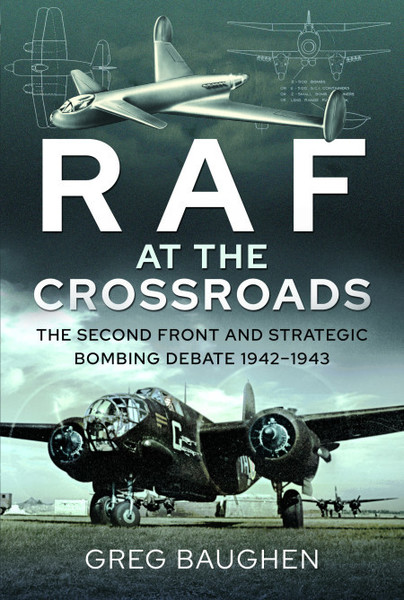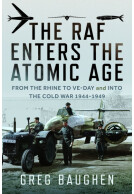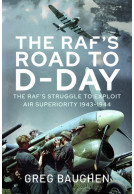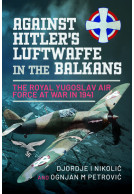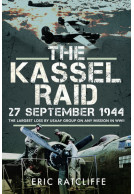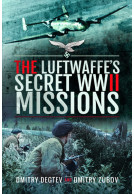RAF at the Crossroads (Hardback)
The Second Front and Strategic Bombing Debate, 1942–1943
Imprint: Air World
Pages: 368
Illustrations: 32 black and white illustrations
ISBN: 9781526795342
Published: 13th April 2021
Publicity!
One Minute Book Launch - RAF at the Crossroads, click here to view
(click here for international delivery rates)
Order within the next 4 hours, 21 minutes to get your order processed the next working day!
Need a currency converter? Check XE.com for live rates
| Other formats available - Buy the Hardback and get the eBook for £1.99! | Price |
|---|---|
| RAF at the Crossroads ePub (29.8 MB) Add to Basket | £6.99 |
The events of 1942 marked a pivotal year in the history of British air power. For more than two decades the theory that long-range bombing could win wars had dominated British defence policy. The vast majority of warplanes ordered for the RAF were designed either to bomb enemy cities or stop the enemy from bombing British cites. Conventional armies and the air forces that supported them were seen as an outmoded way of waging war.
During 1941 evidence began to mount that British policy was wrong. It had become clear the RAF’s bomber offensive against Germany had, until that point, achieved very little. Meanwhile, the wars raging in Europe, Africa and Asia were being decided not by heavy bombers, but by armies and their supporting tactical air forces. Britain had never had the resources to build a large army as well as a strategic bomber fleet; it had always had to make a choice. Now it seemed the country might have made the wrong choice.
For the first time since 1918 Britain began thinking seriously about a different way of fighting wars. Was it too late to change? Was a strategic bombing campaign the only option open to Britain? Could the United Kingdom help its Soviet ally more by invading France as Stalin so vehemently demanded? Could this be done in 1942?
Looking further ahead, was it time to begin the development of an entirely new generation of warplanes to support the Army? Should the RAF have specialist ground attack aircraft and air superiority fighters?
The answers to these questions, which are all explored here by aviation historian Greg Baughen, would help shape the development of British air power for decades to come.
"...a highly readable analysis of not only what was happening, but also why the various parties took the positions they did."
Air Power History, Spring 2022
This is an excellent little book in that it doesn’t look at the normal RAF, it looks very well at the strategic ability and success of the RAF, especially in the second half of the war. The book looks at whether the RAF should abandon the policy of lots of mass bombing or whether Britain needed to concentrate on taking a part of France in order to then be a starting point of allied forces to better take on Germany. This book put across good points for and against for changing the strategy and whether to work closer with the army higher officer, which we all know wasn’t always the best relationship going. I personally think that whichever way help good points but just two ways about achieving the same goals. This was a really good read, and I really enjoyed the debate and discussion about how to go a different way in fighting the war. This book is going to appeal to all sides but especially those interested in aviation and the RAF. Certainly a good book for students that want to look at other ways the war could have been won.
The History Fella
Read the full review here
A deeply researched and highly readable study RAF at the Crossroads is a must read for anyone interested in this central plank of British - and later American - strategy for the war in Europe.
WW2 Today
Read the full review here
I don't have the knowledge of WW2 in the air that others do, but for my money this is a good read and there are enough National Archives references to support the idea that the author has consulted original documents en masse.
Paul Nixon
There's a difference between simply re-hashing official documents and making the end result readable. Greg Baughen succeeds on both fronts though and so I suspect that this book will be greeted with enthusiasm by the knowledgeable elite and the uninitiated masses. I fall into the latter camp but I enjoyed the book and it's almost certainly worth a punt.
5 stars
Read the full review here
Featured by
Royal Aeronautical Society
[An] excellently researched and written volume. Baughen covers in great detail the political, industrial and technological aspects of the bomber campaign and its impact in terms of resources and outcomes for land operations, the Atlantic Battle and Coastal Command operations and the Air Defence of Great Britain. There are insights into the minds of key players including Portal, Tedder, Harris, Douglas, Conningham, Leigh-Mallory, Brooke, Eisenhower and Churchill to name just a few. The book stimulates thought on questions such as “When does doctrine become dogma?”
Martin Willoughby, Chairman of the Wessex Branch of the Western Front Association
I thoroughly recommend this book to those with an interest not only in the Bomber Offensive but also in the more diverse aspects of war strategy and its conduct.
About Greg Baughen
GREG BAUGHEN was educated at Sussex University where he obtained a degree in Mathematics. In a varied teaching career, he has taught Maths and English as a foreign language, to children and adults, in Britain and abroad. His interest in military aviation was sparked at a very early age by curiosity over the defeat of British and French air forces in the Battle of France in 1940. For forty years, he has delved though public archives in Britain and France seeking explanations. The quest has taken him back to the origins of air power in both countries and forwards to what might have been in the Cold War. He then set to work writing a history of air power in both countries.
The first Thousand-Bomber Raid
30th May 1942
On the night of 30/31 May 1942, for the first time the RAF put more than 1,000 bombers over a single German city. The city was Cologne. Nearly 500 people were killed and 13,000 homes destroyed. The raid was a huge media success for Arthur Harris and the bomber strategy. But was it the best way of winning the war?







